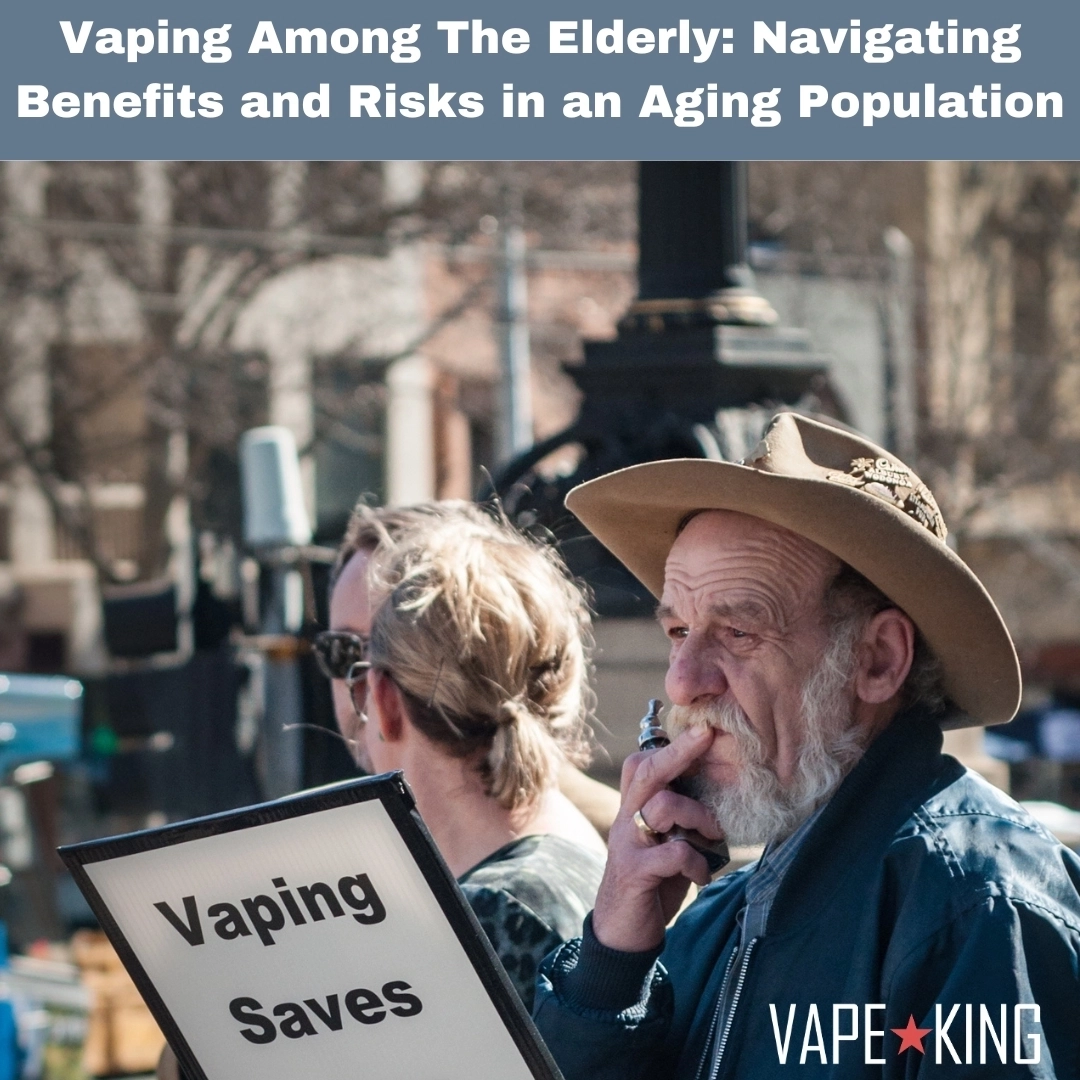Free Shipping on orders R1000 or more!
Vaping Among The Elderly: Navigating Benefits and Risks in an Aging Population

In recent years, there has been a significant transformation in the landscape of tobacco consumption, thanks to the emergence of e-cigarettes as a popular alternative to traditional smoking. While much of the discussion surrounding vaping tends to focus on its impact on younger demographics, an interesting trend has surfaced within the aging population.
As society grapples with shifting attitudes towards smoking, it becomes crucial to comprehend the unique considerations, benefits, and risks associated with vaping among seniors. This exploration aims to shed light on the multifaceted relationship between e-cigarettes and the senior population, offering insights into a subject that delicately balances public health and individual choice.
The Rise Of E-Cigarettes Among the elderly
The rise of e-cigarettes among aging individuals marks a notable departure from traditional patterns of tobacco use within this demographic. Historically, smoking prevalence has been associated more with younger age groups, but recent trends suggest a shift in this paradigm. The appeal of e-cigarettes to seniors can be attributed to various factors.
One key aspect is the perception of e-cigarettes as a less harmful alternative to conventional tobacco products. Seniors, often driven by health concerns, may be drawn to the notion that e-cigarettes eliminate or reduce certain harmful components found in traditional cigarettes. Additionally, the convenience of e-cigarettes, which often come in user-friendly designs and flavors, may attract aging individuals looking for a more accessible and socially acceptable means of nicotine consumption.
As e-cigarettes are marketed as a smoking cessation aid, seniors may also see them as a potential tool to help break the habit of traditional smoking. Understanding the motivations behind this surge in e-cigarette use among seniors is crucial for public health initiatives, as it informs strategies to address the unique challenges and opportunities associated with this evolving trend.
Health Implications: Benefits And Risks
The health implications of e-cigarette use among aging individuals encompass a complex interplay of potential benefits and risks. On the positive side, some seniors may view e-cigarettes as a harm reduction strategy, perceiving them as a less harmful alternative to traditional tobacco products. Advocates argue that e-cigarettes eliminate or significantly reduce exposure to many harmful chemicals and carcinogens associated with combustible cigarettes, potentially lowering the risk of respiratory illnesses and certain cancers. Moreover, the act of transitioning from smoking to vaping might be perceived as a step toward smoking cessation, which could have substantial health benefits.
However, it is essential to balance these potential benefits with the emerging risks. E-cigarettes are not without their health concerns, and the long-term effects of vaping, particularly among seniors, remain insufficiently understood. Respiratory health is a primary area of concern, as studies suggest that inhaling vaporized substances may still pose risks to lung function. Furthermore, the addictive nature of nicotine in e-cigarettes raises concerns about the potential for seniors to develop or exacerbate nicotine addiction, which can have implications for cardiovascular health and overall well-being.
Nicotine Addiction And Cognitive Health Concerns
Nicotine addiction and cognitive health concerns constitute significant aspects of the complex relationship between seniors and e-cigarette use. While e-cigarettes are often promoted as a smoking cessation aid, the addictive nature of nicotine remains a central concern, especially for an aging population. Seniors, who may have been long-term smokers or initiated tobacco use later in life, face the risk of developing or exacerbating nicotine dependence through e-cigarette use.
Nicotine addiction is not only linked to cardiovascular issues but also raises specific cognitive health concerns among seniors. The elderly are already vulnerable to age-related cognitive decline, and nicotine’s impact on the central nervous system can potentially exacerbate these issues. Studies have suggested a possible association between nicotine exposure and an increased risk of cognitive impairments such as memory loss and decreased cognitive function in older individuals. This becomes a critical consideration, particularly as aging individuals seek alternatives to traditional smoking.
Furthermore, the interaction between nicotine and existing cognitive conditions, such as Alzheimer’s disease or other forms of dementia, warrants careful examination. The neurobiological effects of nicotine may have implications for the progression of these conditions, and understanding these potential interactions is vital for healthcare professionals and seniors alike.
Guidelines For Elderly Vapers
Establishing clear guidelines for elderly vapers is imperative to ensure that older individuals who choose to use e-cigarettes can do so in a manner that prioritizes their health and well-being. These guidelines should encompass various aspects, including product selection, usage patterns, and considerations for individuals with pre-existing health conditions.
- Consultation With Healthcare Professionals: Seniors considering vaping should consult with their healthcare professionals before initiating or continuing e-cigarette use. This is particularly crucial for those with pre-existing health conditions, as individual health assessments can guide personalized recommendations.
- Product Selection and Quality: Guidelines should emphasize the importance of selecting reputable and regulated e-cigarette products. Seniors should be informed about the potential risks associated with unregulated products and the importance of choosing devices from established manufacturers to ensure product safety.
- Nicotine Levels And Addiction Management: Aging individuals should be educated about the varying nicotine levels in e-cigarettes and encouraged to start with lower concentrations, especially if they are new to nicotine use. Awareness about the potential for nicotine addiction and strategies for managing and gradually reducing nicotine intake should be highlighted.
- Monitoring Usage Patterns: Guidelines should include recommendations on responsible usage patterns. Seniors should be advised to monitor their e-cigarette use, avoid excessive vaping, and be aware of signs of nicotine toxicity. Regular check-ins with healthcare providers can aid in monitoring overall health.
- Respiratory Health Considerations: Given the potential impact on respiratory health, aging individuals should be informed about the importance of regular lung health assessments. This may include monitoring for symptoms such as coughing, shortness of breath, or chest discomfort.
- Interaction With Medications: Guidelines should address the potential interactions between e-cigarette use and medications commonly prescribed to seniors. Healthcare professionals should be involved in assessing potential conflicts and adjusting medication plans accordingly.
- Support For Smoking Cessation: Seniors who express interest in using e-cigarettes as a smoking cessation tool should be provided with comprehensive support. This may include access to counseling services, behavioral interventions, and resources to aid in the transition away from smoking.
- Regular Health Check-Ups: Encouraging aging individuals to attend regular health check-ups is crucial. These check-ups can facilitate ongoing discussions about e-cigarette use, assess overall health, and address any emerging concerns promptly.
In conclusion, the intersection of vaping and the aging population presents a multifaceted landscape filled with both promise and concern. As e-cigarettes gain traction among seniors, it becomes imperative to navigate the complexities with a balanced perspective. While potential benefits, such as harm reduction and smoking cessation, exist, they must be weighed against the risks of nicotine addiction, respiratory concerns, and cognitive health implications.
No posts found
Write a review

